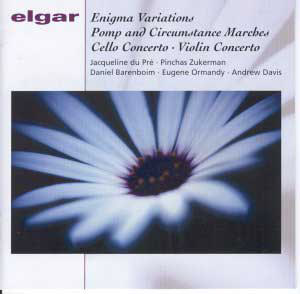No need to beware Sony bearing gifts. This is exactly
what it appears to be: a well proportioned collection built around Elgar's
two great strong concertos. The recordings are, as the Scots say, mostly
well kent to those who have been in ‘the business’ since the sixties.
First to the other (non-concerto) works. Andrew Davis
and the Philharmonia are in cracking form for the P&Cs. Number
one has smashing impact. The Second is flamboyant, and in those horn
calls links back to Schumann's Second and Third Symphonies. Number Three
looks to Rakoczy/Habsburg parallels. The Fourth has a closer kinship
to the First than either of the others. I think with affection of the
Norman Del Mar/RPO marches (coupled originally on a Polydor LP with
Enigma) but these are very very good with alert split-second playing
and acres of brass tone.
Cockaigne and Enigma are Ormandy versions.
They may well be better known in the USA than in the British Isles.
I had not heard them before. They are in fact very idiomatic and fluent
interpretations perhaps a little lush but extremely vivid and with no
lack of flamboyance and celerity (in BGN, HD S-P, RPA, WN) and balletic
sensibility (in GRS). Ormandy's Cockaigne is similarly strong,
plungingly powered, rambunctious and rollicking in splendour. Was that
a touch of Hollywood in the strings at 3.01? And what about the skirling
panache of the violins at 9.34? Would that Ormandy had felt moved to
record In the South. Now if only EMI had tapped into such a dangerously
imaginative move when they went to Phily in the late 1970s to record
Ormandy in Sibelius's Lemminkainen Legends! This all goes to
disprove an old and ultimately cancerous myth about Brits being the
only true interpreters of Elgar.
There are few poor performances of the concertos. There
are two real miscarries of which to beware. The first is the fascinating
but bloatedly distended Ida Haendel version where an aged Boult was
surely the reason. How sad that Haendel did not record it with Del Mar
or Solti. Haendel's BBCSO/Rozhdestvensky concert performance was issued
on the BBC IMP series but sadly I missed this disc (can anyone oblige
me with a CDR?). The second is the lauded EMI recording - the later
Menuhin recording with Boult which, while praised to the skies in most
quarters, has always sent me yawning away. Zukerman and Barenboim are
well matched with imaginative and generous-hearted coups flowing and
tumbling one after the other. The
soloist is sweet-toned without becoming treacly seeming at times to
point up the relationship of this big-hearted tender and impulsive concerto
with the Dvořák and the Brahms. This would serve as a fine library
version of the concerto although once the bug has bitten you
must hear Sammons, Oistrakh, Accardo, Bean (surely to be reissued on
CFP?) and Heifetz (possibly my favourite version but favour keeps shifting
in this company).
This concert recording of the Cello Concerto is seen
by many as an eccentric choice yet it is probably my favourite overall.
It was set down late in Dupré's career assembled from two concerts
in Philadelphia in 1970. It is often compared unfavourably with the
fine but not unchallengeable Dupré EMI studio version with the
LSO and Barbirolli. Sony and before them CBS were well advised to hold
this version in their live retail catalogues. It is a special event;
as special in my view as Beecham in Sibelius 2 (live at the RFH in 1954)
and as Mravinsky in Sibelius 7 in Moscow in 1965. Dupré draws
smouldering and smoking tone from her instrument. Barenboim leads the
Philadelphia in a grand age interpretation only impaired somewhat by
the odd cough and the imperfect detailing of a concert recording. Listen,
and listen in awe, to Dupré's hell-bent accuracy and quicksilver
skitter through the allegro molto (tr 17). This recording is
one of the best kept secrets in the catalogue - seek it out.
Brief and very generalised notes by Jackson Braider.
No mention of the specific works. Neatly packaged in a single-width
double-hinged case. Generous to perfection.
Rob Barnett


